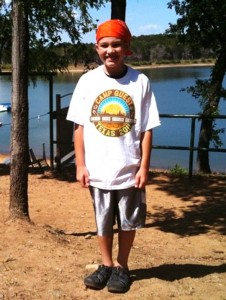Over at Patheos, a number of thoughtful writers have been addressing the question of how we atheists should raise our children when it comes to the touchy subject of religion. There’s a post from Daniel Fincke, and a couple of posts from Kaveh Mousavi, and a post from Libby Anne. I commend them all to your reading.
Now for my 2¢…

I’ve been a parent for just slightly longer than I’ve been active in movement secularism. After bearing our firstborn towards the end of the infamous Florida election recount of 2000, my wife persuaded me that we should move from Albuquerque to Oklahoma City, so that we could raise our children in the midst of an extended family. As the Bible Belt culture shock set in, my natural reaction was to seek out a community of freethinkers, which I helped turn into a real world meetup group, and which has since grown tremendously if somewhat chaotically. Which is to say that my kids have grown up in the middle of a typical churchgoing extended family and in the middle of a thriving atheist group. My firstborn has attended Sunday morning church services (ranging from Baptist to Baha’i), Sunday evening baptisms, and Wednesday night youth groups. He’s also attended countless atheist events and many years of Camp Quest, and he is confident enough in his views that when I drop him off at church I’m more concerned for the other kids than I am for him.
My general approach is to sort questions about the world into two bins, a bin for straightforward factual questions and another bin for matters which are controversial within someone’s peer group. When it comes to the former sort of questions (e.g. “How are rainbows formed?” or “What is the airspeed velocity of an unladen European swallow?”) the explanations come freely for the asking, but the latter sorts of questions (e.g. “Is Santa/Tooth Fairy/Jesus real?” or “Is every sperm sacred?”) generally lead to a dialectical discussion or a more Socratic approach. I take this tack because answers discerned through some degree of personal effort are generally more sticky, and because it would be negligent to send children out into the world with factually correct (but socially unpopular) answers without also giving them the tools to show others how such answers may be obtained, not to mention the tact to know when to hold back.
The point of taking an interactive/interrogative approach is not to “give more weight and respect to religion than astrology, homeopathy…and all the other superstitions” but rather to give my children proportionally more training in how to think critically on the specific issues where they are going to encounter the most nonsense. If homeopathy was bigger than Jesus among the teen set, we’d be spending much more time discussing what that is and why so many people seem to think that water has magical molecular memory. As it is, though, the most popular superstitions here in the American Midwest are spiritual rather than medical.
So far, our approach to religious questions has yielded excellent results, but I’ll report back if something goes sideways. There is, as yet, a long road ahead of us, and God knows what lies in waiting.
